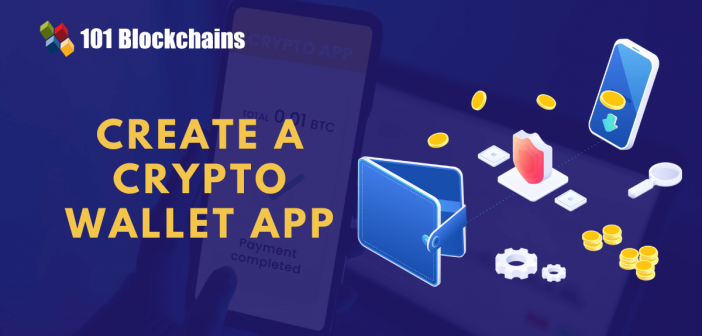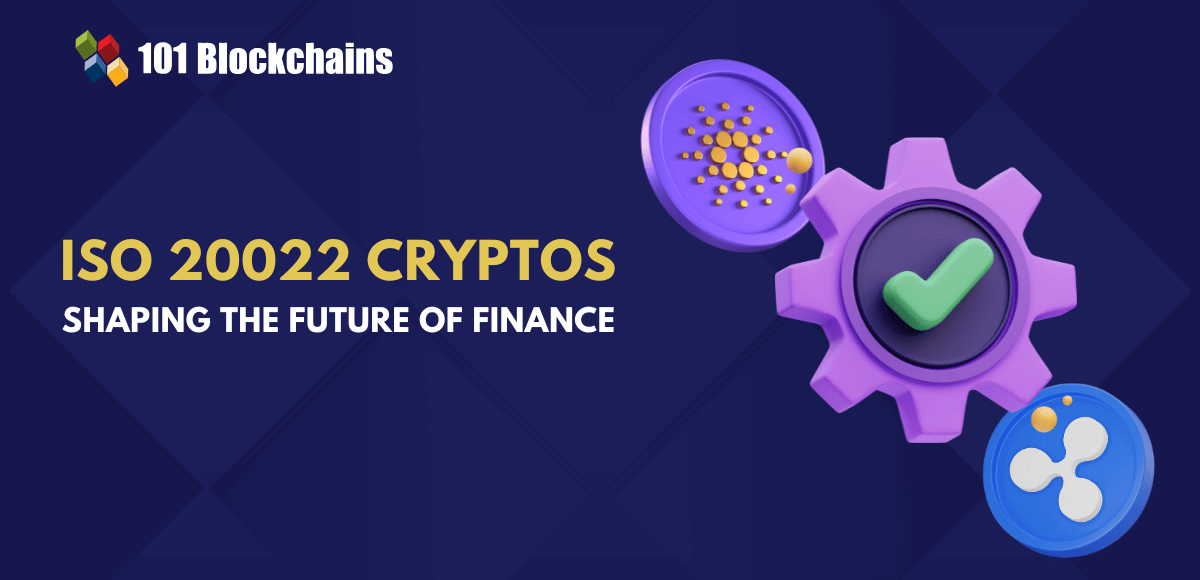Unlock your crypto career potential — become a Certified Cryptocurrency Professional (CCP)™ and master the skills that set you apart in the fast-evolving world of digital assets.

- Cryptocurrency
Georgia Weston
- on December 30, 2022
How to Create a Crypto Wallet App?
The introduction to cryptocurrencies served as an important milestone for transforming financial services alongside establishing the foundation for expanding digital assets. Developers want to create crypto wallet app for using opportunities in the crypto market to their advantage. Cryptocurrencies such as Bitcoin and Ether have offered viable instruments for avoiding the concerns of inflation and crisis.
Most important of all, cryptocurrencies do not fall under the scope of control of corporations, states, and banks. Therefore, assets within the blockchain ecosystem have emerged as prolific alternatives to conventional financial instruments for storing and managing money. However, it is also important to identify the methods for accessing cryptocurrencies, which are practically impossible without crypto wallets.
The number of cryptocurrencies in the global market has increased by unrealistic margins from 66 in 2013 to around 10,000 cryptocurrencies in 2022. Without the knowledge of how to set up a crypto wallet, you are more likely to encounter issues in accessing crypto assets. On top of it, the development of new types of blockchain-based assets also offers viable opportunities for developing crypto apps. The following post offers a detailed overview of the essential steps you must follow to create your crypto wallet app.
Want to become a Cryptocurrency expert? Enroll now in Cryptocurrency Fundamentals Course
The Necessity of Crypto Wallets
Before you seek the answers to “how to make a crypto wallet?” you should identify the reasons for creating one. As of November 2022, the world has almost 80 million blockchain wallet users. Almost 300 million users in the US have already tried working with cryptocurrencies. Most importantly, cryptocurrencies have been garnering mainstream attention, thereby emphasizing the need for crypto wallets. Why should you create one?
The first step in crypto wallet app development should focus on the reason for creating crypto wallets. Now, you must remember that a crypto wallet is essential for almost everything you have to do in the world of cryptocurrencies. Bitcoin or any type of cryptocurrency is stored on blockchain networks, which include computers connected in a peer-to-peer architecture. Anyone could obtain an address for sending and receiving cryptocurrencies, and wallets could serve as the UI portal for accessing the blockchain.
Irrespective of the value advantages such as security, anonymity, and decentralization, cryptocurrencies have been popularized for unrealistic financial growth. In addition, the need to develop crypto wallet app has been gradually becoming more evident with the rising demand for DeFi protocols.
Crypto wallets can help in onboarding customers to any new DeFi solution, such as lending platforms and decentralized crypto exchanges. On top of it, banks and many other financial services institutions and startups seek new options for empowering clients with flexibility for using crypto for trading and investing. All of these factors create significant demand for crypto wallets, thereby implying plausible reasons to develop crypto wallets.
Get familiar with the terms related to cryptocurrency with Cryptocurrency Flashcards.
Essential Features Required in Crypto Wallet Apps
The importance of crypto wallet apps encourages users to find out how to build a crypto wallet app and deploy it in the market. However, a barebones crypto wallet would not serve any practical value for users when they cannot access basic functionalities. The features of a crypto wallet play a vital role in driving its adoption.
Some of the basic features required in cryptocurrency wallets include a user signup facility and a profile connected to a bank account or with a debit/credit card. Other features in crypto wallet apps include the section for favorite addresses, transaction history, and the flexibility of QR code scanning for different transactions. In addition, the crypto wallet app must also showcase real-time crypto pricing information along with charts.
Furthermore, developers should also include the facility of push notifications regarding price movements, transaction details, and app updates. Another significant mandatory feature required in crypto wallet apps refers to security options. You have to include advanced security mechanisms such as multi-factor authentication and encryption of user data and transactions.
Want to get an in-depth understanding of crypto fundamentals, trading and investing strategies? Enroll now in the Crypto Fundamentals, Trading And Investing Course.
The Complexity of Crypto Wallet Development
The outline of basic features can vary when you create your own crypto wallet, as it depends on your requirements. On the other hand, you should understand how the list of requirements for developers can vary considerably for crypto wallets. Let us assume the following critical considerations in the development efforts for creating a simple feature such as signup.
- The facility of semi-automatic switching between wallet app, browser, and email during the registration process.
- Double-checking the passwords with another tab for entering the passphrase again.
- KYC process through image recognition software for accurate scanning of state-issued ID alongside AI for recognizing text and faces.
- Generation of PIN Code.
- FAQs for users who could not log in.
The technical considerations for designing user signup in the process to create crypto wallet app showcase a basic impression of complexity in the complete project. On top of it, you should also pay attention to some of the advanced features which can help a wallet gain a competitive advantage over other solutions. Some of the advanced features in crypto wallets include,
- Scheduling of purchase orders.
- Airdrop listings.
- Wallet import facility.
- Direct integrations with DeFi protocols.
- Facility for fee adjustments during transactions.
The overview of important features required to set up a crypto wallet could help you plan the roadmap. Subsequently, it can help you identify the best picks for a minimum viable product for the crypto wallet.
Dive deeper into the world of cryptocurrencies and understand the technologies powering them alongside through Cryptocurrency Skill Path
Technology Stack Needed in Crypto Wallet Development
Once you have finalized the requirements for features in a crypto wallet, you can move to the next step. At this stage of developing a crypto wallet app, you need to identify the tools which can help the project. The answers to “How to make a crypto wallet?” would emphasize the confusion in finding the ideal technology stack. Interestingly, different developer teams can select technologies according to their experience. Therefore, you can work with diverse tech stacks for creating crypto wallets, albeit with a formidable blockchain foundation.
The first addition to the tech stack for crypto wallet development would refer to the tools for creating mobile apps. You can choose distinct programming languages for developing crypto wallet apps on Android and iOS. Kotlin and Swift are the native programming languages for Android and iOS, respectively. Both programming languages feature advanced toolsets which enable the creation of mobile crypto wallets.
Another important addition in a tech stack to create your own crypto wallet for web platforms would refer to web development tools. The most popular web development tools for creating crypto wallets are React and Node.js. On the other hand, you can choose Flutter or React Native for designing cross-platform crypto wallets, which can work on web browsers and mobile phones. The cross-platform frameworks can help in reusing some of the code for the mobile wallet in the web app code.
The final addition to the tech stack to develop crypto wallet app focuses on the server-side specifics. You can choose between Kubernetes and Docker for the development of a scalable architecture. At the same time, you must also select a smart contract programming language such as Solidity or Golang. Subsequently, developers should choose a programming language such as Python or Ruby for developing the admin portal for the backend management.
Build your identity as a certified blockchain expert with 101 Blockchains’ Blockchain Certifications designed to provide enhanced career prospects.
Stages of Creating a Crypto Wallet App
The outline of features and technologies required for crypto wallet development provides significant inputs for understanding the wallet development process. Where do you start developing the crypto wallet app? Here are the important steps in creating your crypto wallet application.
-
Come Up with a Reasonable Business Idea
Most people think about how to build a crypto wallet app without paying attention to the foremost requirement for apps. Without a valid business idea, your crypto wallet app would be just another addition to the list of numerous wallets. Developers need to find product ideas that would stand out and draw more users.
What is the best way to find out effective ideas for creating your crypto wallet? The answer would point to competitive research, which can help in finding out products that have solved the problem you need to address. For example, you can come up with an idea for a crypto wallet that can help users in tracking their crypto portfolios.
The struggle to find a relevant idea for crypto wallet app development can find some relief in obtaining feedback. Identify the pain points for different use cases of your crypto wallet and determine the list of features needed in the wallet. The awareness about the experience of users with concerned challenges could help you in designing a productive crypto wallet. Some of the important concerns while framing your business idea for the crypto wallet refers to the monetization strategy and a draft version of your project. You should also emphasize the development of in-depth customer personas.
-
Choose Credible Development Partners
After finalizing an idea for your crypto wallet app with the assurance of strong demand, you need to pick reliable development partners. You would need the services of experts in multiple domains to set up a crypto wallet app for success. The best course of action would be to opt for an agency with a team of experts capable of working on your product idea from beginning to end. Apart from developers, you must rely on product and project managers as well as testers and UI/UX designers.
Product managers can help you identify any setbacks in your business idea for the crypto wallet app. Most important of all, they can help in aligning ROI goals with the multiple technical aspects associated with the wallet. Project managers could work on monitoring the process of translating business ideas into tangible solutions.
Testers are also essential contributors in projects to develop crypto wallet app as they ensure safety and desired functionality from crypto wallet apps. On top of it, UI/UX designers work on optimizing the wallet’s user experience according to the target audience. Furthermore, you would require DevOps expertise to manage software administration and server development objectives.
-
Develop the Prototype
The importance of a team in creating crypto wallet apps is clearly evident in the roles served by different professionals. Developers are only contributors to a project for creating cryptocurrency wallets. Now, you must focus your attention on the development of the basic working version of the crypto wallet app.
The interactive prototype of the app could help in developing the minimum viable product or MVP design before public release. Is the prototype essential to create crypto wallet app before developing the MVP? The domain of blockchain and cryptocurrency is still new, with significant costs attributed to blockchain programming.
With the limited availability of blockchain developers, the prototype could help in reducing costs. It could offer a credible impression of the suitable balance of features and user experience elements in the cryptocurrency wallet app. The interactive prototype practically presents a virtual design of the app to enable users to interact with important functionalities. Test users’ feedback could significantly improve prospects for improvement in the app. In addition, repeated testing of interactive prototypes could help you identify whether you have achieved the desired improvements.
-
Creating and Testing the MVP
The next step in the process of developing a cryptocurrency wallet app would focus on the MVP design. MVP, or Minimum Viable Product, refers to the basic version of an app with essential functionalities. The answers to “how to make a crypto wallet?” would be incomplete without referring to the MVP.
In this stage, you would have to identify the essential decisions, such as the type of crypto wallet you want. Do you want a custodial or non-custodial wallet? In addition, you need to identify where your users are more likely to use the wallet app. For example, the Metamask wallet works as a browser extension, and desktop users can access the wallet easily.
In addition, the development of a crypto wallet app would also emphasize on the selection of crypto APIs and SDKs. The APIs and SDKs could help in integrating additional functionalities such as crypto on-ramps and simplified management of payment addresses. It is important to emphasize agile development practices alongside comprehensive security audits to avoid potential vulnerabilities.
-
Final Release and Maintenance
The final step in the answers for “how to build a crypto wallet app” would focus on the public release. In addition, the subsequent maintenance of crypto wallet apps is also essential for managing sudden growth in the number of customers. Some of the essential concerns in the public release would focus on uploading the app on Google Play or the App Store. At the same time, you must also shift the server side to production-ready environments.
Embrace the technological leap and global adoption that awaits in the upcoming bull run with Crypto Bull Run Ready Career Path.
Final Words
The complexity of requirements and different stages in crypto wallet app development can be overwhelming for beginners. However, a closer look at the whole process of creating crypto wallets could help you develop a unique wallet app. All you need is a valid business idea capable of addressing the problems of a broader user base.
Subsequently, the selection of the right development partners could help you achieve the desired objectives in creating your own wallet app. The most important ingredient for driving the popularity of a new crypto wallet app would refer to the essential features required for them. Start learning more about crypto wallets and their role in the web3 ecosystem.
*Disclaimer: The article should not be taken as, and is not intended to provide any investment advice. Claims made in this article do not constitute investment advice and should not be taken as such. 101 Blockchains shall not be responsible for any loss sustained by any person who relies on this article. Do your own research!






